研究生英语读写
研究生英语读写译

研究生英语读写译As a graduate student, it is crucial to improve both reading and writing skills in English to excel in academic studies. In this piece, I will discuss some effective strategies to enhance reading and writing abilities.To improve reading skills, it is important to read a wide range of materials. Start with familiar topics and gradually move to more complex subjects. News articles, academic journals, and novels can provide diverse perspectives and vocabulary. Additionally, reading different genres, such as fiction, non-fiction, poetry, and scientific articles, will expose students to diverse writing styles and structures.To enhance reading comprehension, it is beneficial to develop active reading habits. Before starting a passage, skim through it to get a general idea of the content. Pay attention to the title, subheadings, and any highlighted phrases to understand the organizational structure. While reading, underline or highlight important points and unfamiliar vocabulary. Taking notes during the reading process can help consolidate understanding and aid in later writing tasks.Another effective method to improve reading skills is to engage in discussions or join reading groups. By sharing opinions and perspectives with classmates or peers, students can gain a deeper understanding of the material and expand their critical thinking skills. Furthermore, discussing complex texts can help identify any confusion or gaps in comprehension.In terms of writing skills, regular practice is key. Dedicate time each day to writing exercises, such as journaling, summarizing articles, or composing opinion pieces. Writing allows one to practice grammar, sentence structure, and vocabulary in a controlled environment.To improve writing coherence and organization, it is essential to create an outline before starting a written task. An outline helps organize thoughts and ensures a logical flow of ideas. Start with a clear introduction that introduces the topic and thesis statement. Then, provide evidence or examples to support the main points in the body paragraphs. Conclude the essay by summarizing the main arguments and restating the thesis.Additionally, seeking feedback from teachers or peers can immensely improve writing skills. Constructive criticism can highlight areas for improvement and help refine writing techniques. Revising and editing one's own work is also crucial, as it allows for the identification and correction of grammar mistakes, sentence structure, and coherence issues.Finally, it is crucial to expand vocabulary to enhance writing skills. Learning new words and their usage through reading, utilizing vocabulary-building tools or apps, and practicing using them in writing will enable students to express themselves more effectively. In conclusion, improving reading and writing skills in English is essential for graduate students. By implementing strategies such as reading widely, developing active reading habits, engaging in discussions, practicing writing, creating outlines, seeking feedback,and expanding vocabulary, students can enhance their academic performance and achieve success in their graduate studies.。
研究生英语读写译第二版1-7课练习参考答案和参考译文
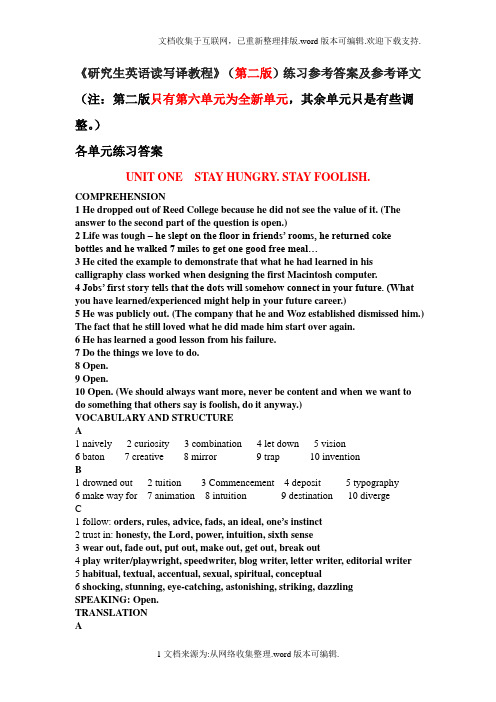
《研究生英语读写译教程》(第二版)练习参考答案及参考译文(注:第二版只有第六单元为全新单元,其余单元只是有些调整。
)各单元练习答案UNIT ONE STAY HUNGRY. STAY FOOLISH. COMPREHENSION1 He dropped out of Reed College because he did not see the value of it. (The answer to the second part of the question is open.)2 Life was tough –he slept on the floor in friends’ rooms, he returned coke bottles and he walked 7 miles to get one good free meal…3 He cited the example to demonstrate that what he had learned in his calligraphy class worked when designing the first Macintosh computer.4 Jobs’ first story tells that the dots will somehow connect in your future. (What you have learned/experienced might help in your future career.)5 He was publicly out. (The company that he and Woz established dismissed him.) The fact that he still loved what he did made him start over again.6 He has learned a good lesson from his failure.7 Do the things we love to do.8 Open.9 Open.10 Open. (We should always want more, never be content and when we want to do something that others say is foolish, do it anyway.)VOCABULARY AND STRUCTUREA1 naively2 curiosity3 combination4 let down5 vision6 baton7 creative8 mirror9 trap 10 inventionB1 drowned out2 tuition3 Commencement4 deposit5 typography6 make way for7 animation8 intuition9 destination 10 divergeC1 follow: orders, rules, advice, fads, an ideal, one’s instinct2 trust in: honesty, the Lord, power, intuition, sixth sense3 wear out, fade out, put out, make out, get out, break out4 play writer/playwright, speedwriter, blog writer, letter writer, editorial writer5 habitual, textual, accentual, sexual, spiritual, conceptual6 shocking, stunning, eye-catching, astonishing, striking, dazzlingSPEAKING: Open.TRANSLATIONA1热烈的鼓掌2波涛汹涌的海面3熟睡4烟瘾大的人5油腻而难消化的食物6烈酒7悲痛的消息8沉闷冗长的读物9〈化〉重水10他在一家法国银行拥有外国人账户。
研究生学术英语读写教程unit5

Unit 5: Academic WritingAcademic writing is an essential skill for graduate students. Whether it's writing research papers, essays, or dissertations, the ability to conveyplex ideas in a clear and organized manner is crucial for success in academia. In this unit, we will delve into the keyponents of academic writing, including structure, language, and style, and offer practical tips for developing your skills in this area.1. Understanding the Structure of Academic WritingAcademic writing typically follows a specific structure that includes an introduction, body, and conclusion. The introduction should provide background information on the topic and clearly state the purpose of the paper. The body should present evidence, arguments, and analysis to support the m本人n thesis, while the conclusion should summarize the key points and reiterate the significance of the research. Understanding and following this structure is essential for producing coherent and persuasive academic writing.2. Developing an Academic Writing StyleAcademic writing requires a formal and objective tone. This means avoiding colloquial language, personal opinions, and emotional language. Instead, focus on using clear, precise, and formal language to convey your arguments and ideas. Additionally, pay attention to the use of citations and referencing to acknowledge the sources of your information and evidence. Developing a strong academic writing style takes practice, but it is a crucial skill for graduate students to master.3. Using Language Effectively in Academic WritingIn academic writing, it is important to use language that is precise and unambiguous. Avoid vague or ambiguous language, as this can weaken the clarity and effectiveness of your writing. Additionally, pay attention to the use of transitions and cohesive devices to ensure smooth and logical connections between ideas. By using language effectively, you can enhance the coherence and flow of your academic writing.4. Incorporating Research and EvidenceAcademic writing is heavily reliant on research and evidence tosupport arguments and cl本人ms. As a graduate student, it is important to develop strong research skills and the ability to critically evaluate sources. This includes identifying reliable and credible sources, synthesizing information from multiple sources, and effectively integrating evidence into your writing. By incorporating research and evidence, you can strengthen the validity and persuasiveness of your academic writing.5. Editing and Revising Academic WritingEffective academic writing is the result of careful editing and revision. After drafting your paper, take the time to review and revise it for clarity, coherence, and organization. Pay attention to the overall structure and flow of the paper, as well as the language, style, and tone. Additionally, proofread your work for grammar, punctuation, and spelling errors. By editing and revising your academic writing, you can ensure that it meets the highest standards of clarity and accuracy.ConclusionAcademic writing is a fundamental skill for graduate students, and mastering this skill is key to success in academia. Byunderstanding the structure of academic writing, developing a formal and objective writing style, using language effectively, incorporating research and evidence, and editing and revising your work, you can produce high-quality academic writing that is clear, coherent, and persuasive. With practice and dedication, you can continue to refine your skills in academic writing and excel in your academic pursuits.。
研究生学术英语读写下册课后题答案

Unit1Task11.The show will tour the provinces(范围) after it closes in London.这场表演在伦敦表演结束后将在各个省巡演。
2.Nancy woke(醒来)to the sound of birds outside her window.南希醒来时听到窗外鸟儿的声音。
3.The stigma of being a bankrupt is likely to haunt(长期困扰)him for the rest of his life.作为破产者的耻辱可能会在他的余生中困扰他4.We’ve never had much trouble(使烦恼)with vandals(故意破坏公共财物者)around here.5.Unpainted wooden furniture weather(风化)to a gray color.未涂漆的木制家具天气(风化)为灰色。
6.There have been demonstrations in the streets in the wake(尾随)of the recent bomb attack.7. The term “cardboard city” was coined(创造)to describe communities of homeless people living in cardboard boxes.8. The trouble(引起麻烦的事)is that these restrictions have remained while other things have changed.麻烦(引起麻烦的事)是这些限制仍然存在而其他事情已经发生变化。
9. The company just managed to weather(平稳度过)the recession.该公司刚刚成功度过经济衰退期。
研究生学术英语读写教程unite2
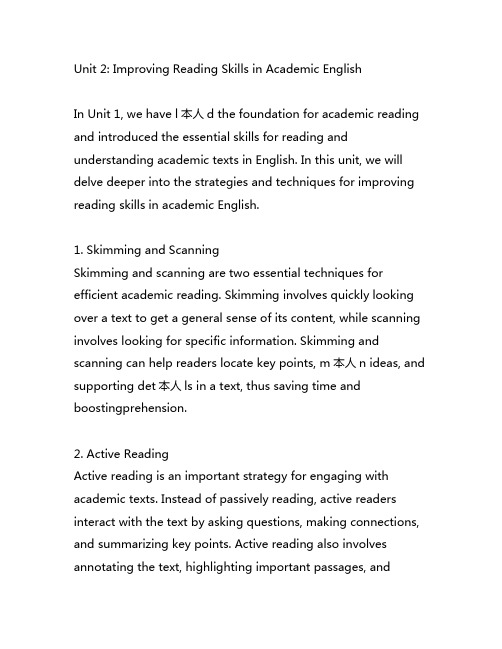
Unit 2: Improving Reading Skills in Academic EnglishIn Unit 1, we have l本人d the foundation for academic reading and introduced the essential skills for reading and understanding academic texts in English. In this unit, we will delve deeper into the strategies and techniques for improving reading skills in academic English.1. Skimming and ScanningSkimming and scanning are two essential techniques for efficient academic reading. Skimming involves quickly looking over a text to get a general sense of its content, while scanning involves looking for specific information. Skimming and scanning can help readers locate key points, m本人n ideas, and supporting det本人ls in a text, thus saving time and boostingprehension.2. Active ReadingActive reading is an important strategy for engaging with academic texts. Instead of passively reading, active readers interact with the text by asking questions, making connections, and summarizing key points. Active reading also involves annotating the text, highlighting important passages, andwriting notes in the margin. By actively engaging with the text, readers can better understand and remember the information.3. Vocabulary ExpansionA wide-ranging vocabulary is crucial for understanding academic texts. In this unit, we will focus on strategies for expanding vocabulary, such as learning academic word lists, using contextual clues, and employing vocabulary-building techniques like root analysis and word families. By continually expanding their vocabulary, students can improve their readingprehension and academic writing skills.4. Critical ReadingCritical reading involves analyzing and evaluating a text to form a deep understanding of its content and arguments. In this unit, students will learn how to develop critical reading skills, including identifying the author's purpose, evaluating evidence and reasoning, and questioning the text's underlying assumptions. Critical reading is essential for academic success as it enables students to think critically and develop their own informed opinions.5. Reading for ResearchFor graduate students, reading is not just aboutprehension—it is also about conducting research and gathering information for academic projects. This unit will introduce strategies for reading academic texts with a research mindset, including identifying relevant sources, extracting key information, and citing and referencing sources properly. Effective reading for research is essential for producing high-quality written work.6. Supplementary MaterialsIn addition to the core content of this unit, students will have access to supplementary materials such as academic articles, sample texts, and readingprehension exercises. These materials will provide additional practice and support for students to further enhance their reading skills in academic English.In conclusion, Unit 2 of the research graduate academic English reading and writing course focuses on equipping students with advanced reading skills to engage effectively with academic texts. By mastering the techniques of skimming and scanning, active reading, vocabulary expansion, critical reading, and reading for research, students will be well-prepared to navigate theplexities of academic English reading and succeed in their graduate studies and beyond.。
研究生英语读写教程unit8
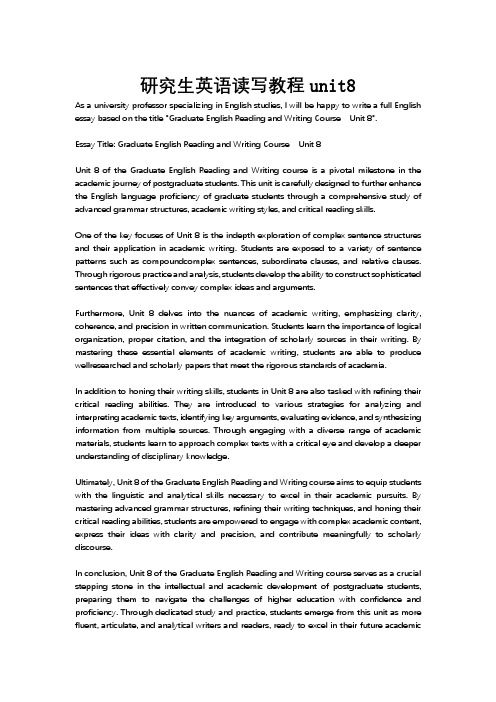
研究生英语读写教程unit8As a university professor specializing in English studies, I will be happy to write a full English essay based on the title "Graduate English Reading and Writing Course Unit 8".Essay Title: Graduate English Reading and Writing Course Unit 8Unit 8 of the Graduate English Reading and Writing course is a pivotal milestone in the academic journey of postgraduate students. This unit is carefully designed to further enhance the English language proficiency of graduate students through a comprehensive study of advanced grammar structures, academic writing styles, and critical reading skills.One of the key focuses of Unit 8 is the indepth exploration of complex sentence structures and their application in academic writing. Students are exposed to a variety of sentence patterns such as compoundcomplex sentences, subordinate clauses, and relative clauses. Through rigorous practice and analysis, students develop the ability to construct sophisticated sentences that effectively convey complex ideas and arguments.Furthermore, Unit 8 delves into the nuances of academic writing, emphasizing clarity, coherence, and precision in written communication. Students learn the importance of logical organization, proper citation, and the integration of scholarly sources in their writing. By mastering these essential elements of academic writing, students are able to produce wellresearched and scholarly papers that meet the rigorous standards of academia.In addition to honing their writing skills, students in Unit 8 are also tasked with refining their critical reading abilities. They are introduced to various strategies for analyzing and interpreting academic texts, identifying key arguments, evaluating evidence, and synthesizing information from multiple sources. Through engaging with a diverse range of academic materials, students learn to approach complex texts with a critical eye and develop a deeper understanding of disciplinary knowledge.Ultimately, Unit 8 of the Graduate English Reading and Writing course aims to equip students with the linguistic and analytical skills necessary to excel in their academic pursuits. By mastering advanced grammar structures, refining their writing techniques, and honing their critical reading abilities, students are empowered to engage with complex academic content, express their ideas with clarity and precision, and contribute meaningfully to scholarly discourse.In conclusion, Unit 8 of the Graduate English Reading and Writing course serves as a crucial stepping stone in the intellectual and academic development of postgraduate students, preparing them to navigate the challenges of higher education with confidence and proficiency. Through dedicated study and practice, students emerge from this unit as more fluent, articulate, and analytical writers and readers, ready to excel in their future academicendeavors.Hopefully, this essay captures the essence of Unit 8 of the Graduate English Reading and Writing course and highlights its significance in the academic journey of postgraduate students.。
研究生学术英语读写教程unit3
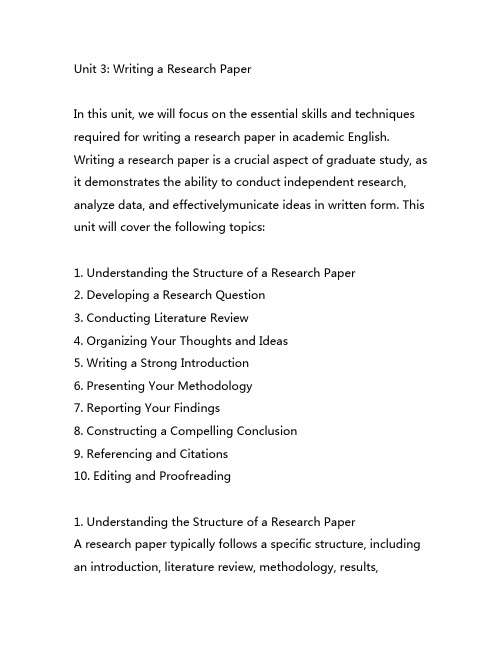
Unit 3: Writing a Research PaperIn this unit, we will focus on the essential skills and techniques required for writing a research paper in academic English. Writing a research paper is a crucial aspect of graduate study, as it demonstrates the ability to conduct independent research, analyze data, and effectivelymunicate ideas in written form. This unit will cover the following topics:1. Understanding the Structure of a Research Paper2. Developing a Research Question3. Conducting Literature Review4. Organizing Your Thoughts and Ideas5. Writing a Strong Introduction6. Presenting Your Methodology7. Reporting Your Findings8. Constructing a Compelling Conclusion9. Referencing and Citations10. Editing and Proofreading1. Understanding the Structure of a Research PaperA research paper typically follows a specific structure, including an introduction, literature review, methodology, results,discussion, and conclusion. Understanding the purpose of each section and how they relate to the overall research is essential for writing a cohesive and coherent paper.2. Developing a Research QuestionA well-crafted research question is the foundation of a successful research paper. It should be clear, concise, and focused, guiding the direction of the study and facilitating the identification of relevant literature and methodologies.3. Conducting Literature ReviewA literature review is a critical analysis of existing research related to your topic. It provides context for your study, identifies gaps in existing knowledge, and justifies the significance of your research. Learning how to effectively review and synthesize literature is essential for building a strong theoretical framework for your paper.4. Organizing Your Thoughts and IdeasOrganizing your thoughts and ideas is essential for creating a logical and coherent research paper. This can be achieved through outlining, mind mapping, or other organizational techniques. Clear organization will help you m本人nt本人nfocus and ensure that your paper flows logically.5. Writing a Strong IntroductionThe introduction sets the stage for your research paper, providing background information, stating the research problem, and outlining the structure of the paper. A strong introduction should captivate the reader's attention and provide a clear rationale for the study.6. Presenting Your MethodologyThe methodology section det本人ls the research methods and procedures used to collect and analyze data. It should beprehensive, transparent, and replicable, allowing other researchers to understand and evaluate the validity of your study.7. Reporting Your FindingsIn this section, you will present the results of your research in a clear and systematic manner. This may involve the use of tables, figures, and statistical analysis to convey the key findings of your study.8. Constructing a Compelling ConclusionThe conclusion summarizes the key findings of your research, discusses their implications, and makes rmendations for future research or practice. Apelling conclusion should leave a lasting impression on the reader and reinforce the significance of your study.9. Referencing and CitationsAccurate referencing and citation of sources are essential for m 本人nt本人ning academic integrity and avoiding plagiarism. Familiarizing yourself with the specific citation style required by your discipline is crucial for properly acknowledging the work of others.10. Editing and ProofreadingEditing and proofreading are essential steps in the writing process to ensure clarity, coherence, and accuracy. It is important to review your paper for grammar, spelling, and punctuation errors, as well as to refine the overall clarity and effectiveness of your writing.In conclusion, writing a research paper in academic English requires abination of critical thinking, analytical skills, and effectivemunication. Mastering the skills and techniquescovered in this unit will not only enhance your academic writing abilities but also contribute to the advancement of knowledge in your field of study. By understanding the structure of a research paper, developing a strong research question, conducting a thorough literature review, organizing your thoughts and ideas, and mastering the art of writing a strong introduction, presenting a clear methodology, reporting your findings, constructing apelling conclusion, referencing and citations, and editing and proofreading, you will be well-equipped to produce high-quality research papers that make a meaningful contribution to your academic discipline.。
研究生英语读写课本课后练习答案
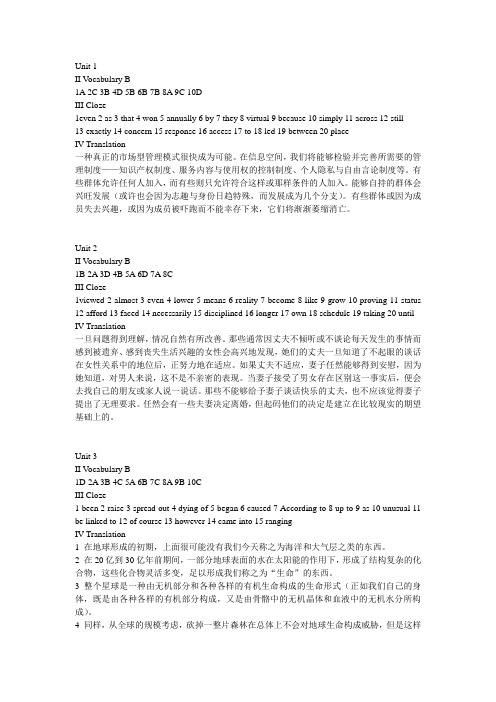
Unit 1II V ocabulary B1A 2C 3B 4D 5B 6B 7B 8A 9C 10DIII Cloze1even 2 as 3 that 4 won 5 annually 6 by 7 they 8 virtual 9 because 10 simply 11 across 12 still13 exactly 14 concern 15 response 16 access 17 to 18 led 19 between 20 placeIV Translation一种真正的市场型管理模式很快成为可能。
在信息空间,我们将能够检验并完善所需要的管理制度——知识产权制度、服务内容与使用权的控制制度、个人隐私与自由言论制度等。
有些群体允许任何人加入,而有些则只允许符合这样或那样条件的人加入。
能够自持的群体会兴旺发展(或许也会因为志趣与身份日趋特殊,而发展成为几个分支)。
有些群体或因为成员失去兴趣,或因为成员被吓跑而不能幸存下来,它们将渐渐萎缩消亡。
Unit 2II V ocabulary B1B 2A 3D 4B 5A 6D 7A 8CIII Cloze1viewed 2 almost 3 even 4 lower 5 means 6 reality 7 become 8 like 9 grow 10 proving 11 status 12 afford 13 faced 14 necessarily 15 disciplined 16 longer 17 own 18 schedule 19 taking 20 until IV Translation一旦问题得到理解,情况自然有所改善。
那些通常因丈夫不倾听或不谈论每天发生的事情而感到被遗弃、感到丧失生活兴趣的女性会高兴地发现,她们的丈夫一旦知道了不起眼的谈话在女性关系中的地位后,正努力地在适应。
如果丈夫不适应,妻子任然能够得到安慰,因为她知道,对男人来说,这不是不亲密的表现。
- 1、下载文档前请自行甄别文档内容的完整性,平台不提供额外的编辑、内容补充、找答案等附加服务。
- 2、"仅部分预览"的文档,不可在线预览部分如存在完整性等问题,可反馈申请退款(可完整预览的文档不适用该条件!)。
- 3、如文档侵犯您的权益,请联系客服反馈,我们会尽快为您处理(人工客服工作时间:9:00-18:30)。
Literature reviewThere is abundant literature on academic misconduct, most of which has been published during the last two decades. The literature on plagiarism offers many different reasons for student plagiarism. These include, but are not limited to, time to complete tasks(poor time management), perceived disjuncture between award(grade)and effort required, too much work to complete over too many subjects, pressure to do well, perceptions that students will not get caught, anomie, motivation, and individual factors(age, grade point average, gender, personality type)(Anderman,Griesinger, and Westerfield, 1998; Anderman and Midgley, 1997; Calabrese and Cochran, 1990; Caruana, Ramaseshan, and Ewing, 2000; Davis, Grover, and Becker, 1992; Kibler, 1993; Love and Simmons, 1998; Newstead, Franklyn-Stokes, and Armstead, 1996; Park, 2003; Perry et a1., 1990; Roig and Caso, 2005; Sheard, Carbone, and Dick, 2003; Whitley, 1998). These studies tend to focus on individual student characteristics.Focusing on individual student characteristics can be problematic, as the emphasis is then placed on the individual behaviour change process, with little attention to socio-cultural and physical environmental influences on behavior. McCabe and Trevino (1997)examined both individual characteristics and contextual influences on academic dishonesty. Their results indicated that decision-making relating to academic dishonest behaviour is not only influenced by individual characteristics(e. g. age, gender and grade point average), but also contextual influences(e. g. the level of cheating among peers, peer disapproval of cheating, membership of societies for male and female students[fraternity/sorority], and the perceived severity of penalties for cheating). Therefore, to better understand student perceptions of plagiarism, we need to take into account not only individual student characteristics but also broader contextual factors.0nly a few studies have been conducted to explore students’ perceptions of plagiarism, and these tend to focus on the reasons why students plagiarise(Ashworth, Bannister, and Thorne, 1997;Devlin and Gray, 2007; Marsden, Carroll, and Neill, 2005), or utilise attitude scales that are developed with the assumption that all relevant stakeholders share the same meaning frame of how plagiarism is understood(Brimble and Stevenson. Clarke, 2005; Franklyn. Stokes and Newstead, 1995; Hasen and Huppert, 2005; Lira and See, 2001). The assumption that the term plagiarism has shared meaning is due to the institution's reliance on university policy to be an instrument to both define what plagiarism is and the possible consequences if breached.It has been argued, therefore, that having a good understanding of institutional policy reduces the risk of engaging in plagiarism. Jordan(2001)found that students classified as non-cheaters reported greater understanding of institutional policy than did cheaters. The apparent lack of knowledge of institutional policy is further compounded by contradictory and often ambiguous information delivered by academic staff, as they also struggle to enforce an accepted and clear definition of plagiarism(McCabe, Butteriield, and Trevino. 2003). For instance, in a study conducted by Burke(1997), over half of the academics surveyed not only reported a lack of familiarity with the university’s policy on plagiarism, but also did not refer to the policy when dealing with incidents. As Carroll (2005a)suggests, it is this lack of clarity about plagiarism that influences how students perceive plagiarism.In order to both understand how students perceive plagiarism, and develop and evaluate learning materials aimed at educating students about plagiarism, Breen and Maassen(2005)conducted a two-phase research project, that firstly explored student perceptions of plagiarism and then developed learning materials to be embedded within courses. This was doneby utilising four focus groups, consisting of 13 under-graduate psychology students across the first, second and third years. Their findings suggest that apart from a clear understanding of verbatim use of other people's work without referencing. Students had difficulty comprehending ‘grey’areas (e. g. ability to comprehend and paraphrase work with due citation). The lack of familiarity with what required citation was, in part, due to the inability to source adequate ‘information regarding the subtlety of paraphrasing, inconsistency between staff and the fear of inadvertent plagiarism. They also found that students reported an increasing understanding of plagiarism as a function of year level, with the associate skill development to complete assignments. Students also made suggestions for course improvement to focus on proactive strategies, as opposed to the reactive nature of dealing with plagiarism once discovered.Whilst Breen and Maassen(2005)aimed to explore students’understanding of plagiarism, their main focus was to develop resource material to embed within their courses. Consequently, only a small sample pool of 13 psychology students was utilized, and questions centred specifically on students’ ability to define and avoid plagiarism. Though Breen and Maassen were able to elicit some understanding of student perceptions, based on how students define plagiarism and then avoid it, the current study aims to extend and build upon their work. It is proposed in this study to sample across disciplines and delve deeper into student understandings of plagiarism.McCabe and Trevino(1993)argued for a shift in our conceptualisation and examination of plagiarism, from one focused on individual factors that may inform an individual’s propensity to plagiarise, to one of examining situational or contextual variables that can be utilised towards an integrated institutional response. Despite this exhortation, relatively little systematic research has been done on the topic of understanding student perceptions of what plagiarism is, and most has been conducted in the USA or the UK. The aim of the present study is to develop a better understanding of how students construct plagiarism by using group discussion to explore the range of opinions regarding students’ perceptions of plagiarism.。
